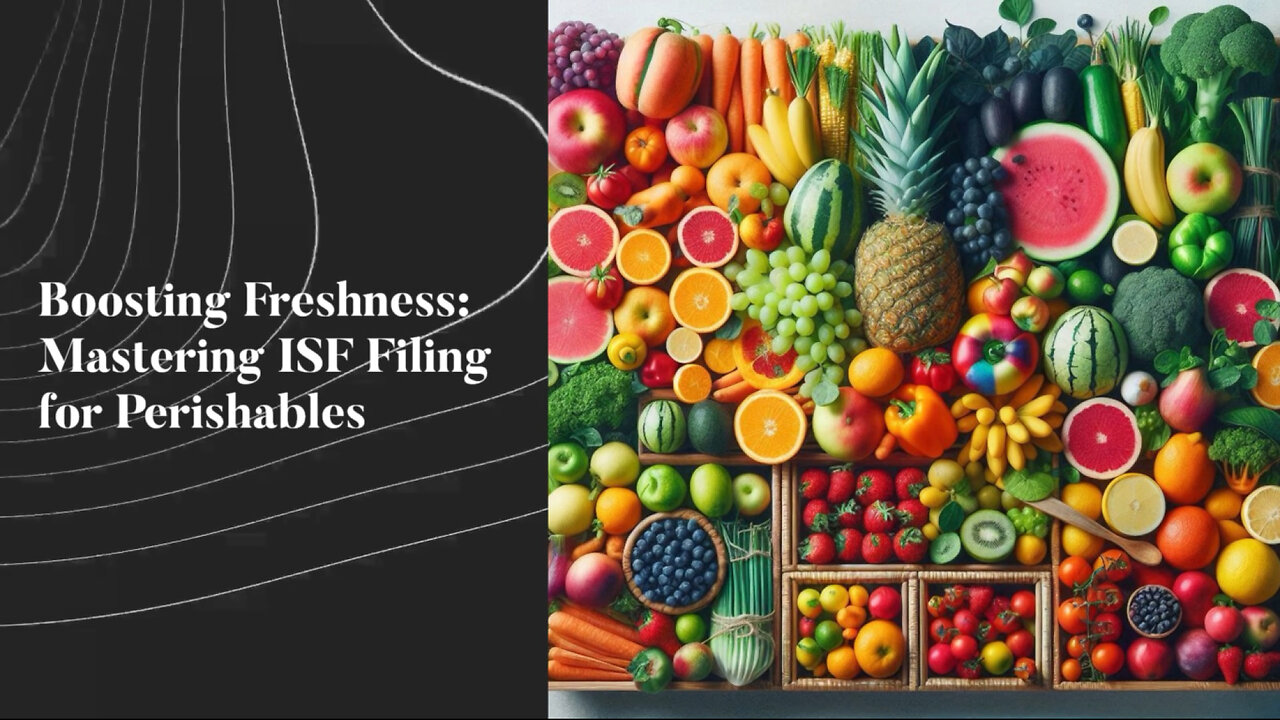Premium Only Content

Preserving Freshness: The Essential Steps of ISF Filing for Perishable Goods
ISF Filer || isf@isffiler.com || 858-280-9374 || www.isffiler.com
The ISF filing process is an essential part of preserving the quality of perishable goods in the fresh supply chain. Importer Security Filing, or ISF, is a mandatory requirement by US Customs and Border Protection (CBP) for ocean shipments. It enhances security, improves cargo identification, and enables risk assessment.
To ensure the preservation of perishable goods, several important steps need to be followed in the ISF filing process. The first step is data gathering, which involves collecting detailed information about the importer, seller, vessel or flight details, and a thorough description of the perishable goods being imported.
Next, a customs bond is required for compliance and financial protection. This bond acts as a guarantee that the importer will adhere to CBP regulations and fulfill their obligations. It also provides protection for the CBP in case of any customs violations or unpaid duties.
Once the necessary information and customs bond are in order, the ISF paperwork needs to be electronically filed. This can be done either through a licensed customs broker or directly by the importer. The filing must be submitted at least 24 hours before the goods are loaded onto the vessel departing from the foreign port.
After the ISF filing is completed, the data is transmitted electronically to the CBP. This information allows the CBP to assess the risk associated with the shipment and identify any potential security concerns. It also enables them to pre-screen the shipments before they arrive in the United States, facilitating a smoother customs clearance process.
Upon arrival, the perishable goods undergo CBP inspection to ensure compliance with import regulations and verify the accuracy of the ISF data. Any discrepancies or issues found during the inspection process may lead to delays or additional inspections.
Finally, after the CBP inspection, the perishable goods are released for delivery to their intended destination. Thanks to the proper ISF filing process, the goods can reach their destination in optimal condition, preserving their freshness and quality throughout the supply chain.
By following these steps and ensuring compliance with CBP regulations, importers can effectively maintain the quality of their perishable goods and deliver fresh produce, flowers, seafood, and more to consumers. Stay tuned for more informative videos on customs brokerage and international trade.
#usimportbond #isfcustomsbroker #uscustomsclearing #isfentry
Video Disclaimer Here: This video is intended for educational purposes and has no affiliation with US government entities.
1:02 - Data Gathering
1:22 - Customs Bond
1:45 - Electronic Filing
-
 LIVE
LIVE
Roseanne Barr
2 hours ago $4.51 earnedOur Leader: Alex Jones | The Roseanne Barr Podcast #97
3,288 watching -
 LIVE
LIVE
Nerdrotic
1 hour agoThunderbolts Group Therapy, James Gunn's Superman LEAKS, PolyGONE | Friday Night Tights 352
2,350 watching -
 LIVE
LIVE
Dr Disrespect
5 hours ago🔴LIVE - DR DISRESPECT - ARC RAIDERS - THE WAIT IS OVER
2,920 watching -
 DVR
DVR
RiftTV/Slightly Offensive
1 hour agoWhite Mom DOXXED, Was She RIGHT? MS-13 Member EXPOSED | The Rift Report
3.88K3 -
 LIVE
LIVE
Twins Pod
14 hours agoJordan Peterson Meltdown, Epstein Victim Mystery & BLACK Pope?! | Twins Pod | Episode 63
1,094 watching -
 25:09
25:09
Scary Mysteries
4 hours agoIdaho's UNEXPLAINED Vanishing of Terrence Woods Jr.
37 -
 2:16:50
2:16:50
The Quartering
3 hours agoAmerica's Black Fatigue
115K53 -
 LIVE
LIVE
StoneMountain64
3 hours agoNEW Easter Eggs, Sniper NOT Nerfed, FAST Friday
115 watching -

Jeff Ahern
1 hour agoFriday Freak out with Jeff Ahern
3.09K -
 9:53
9:53
Silver Dragons
2 hours agoPROOF THAT SILVER PRICE IS MANIPULATED LOWER
2.61K